
Last modified: 2014-06-29 by klaus-michael schneider
Keywords: maia | coat of arms (chief) | cross: rounded | cross: maltese | wheat: ears: 3 | waves: 3 | eagle (golden) | eagle: half | lidador | gonçalo mendes da maia | cross: maltese (white) | crown: marian | gepha |
Links: FOTW homepage |
search |
disclaimer and copyright |
write us |
mirrors
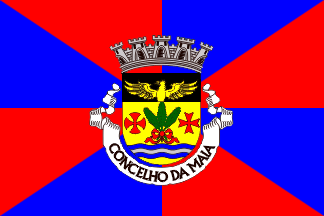
It is a fairily typical portuguese municipal flag, with the coat of arms centered on a blue and red background gyronny (city rank).
According to Sério Horta’s website, these flag and arms (with trivial changes from the previous one) were not yet officially adopted, but are in use since 1986.08.23, when the municipality seat was upgraded to city status — this long lag surely due to the red and blue background, unacceptable to the heraldic authority but probably insisted on by the municipal government.
António Martins, 09 Nov 2007
.gif)
The arms are Gules three ears of wheat tied in red between an orbicular (so
called Portuguese Templar) cross gules at dexter and
a Maltese cross Gules at sinister and above a fess
wavy Azure charged with a fess wavy Argent and on a chief gules an eagle
displayed Or issuant from the base. Mural crown argent with five visible towers
(city rank) and white scroll reading in black
upper case letters "Concelho da Maia".
António Martins, 09 Nov 2007
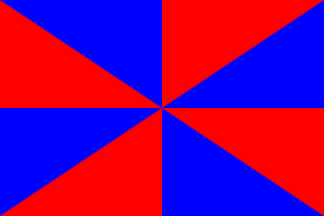
Plain (monocolored) portuguese subnational flags are
not allowed to have armless
variations: plain flags always carry the coat of arms.
Jorge Candeias, 18 Jul 1999
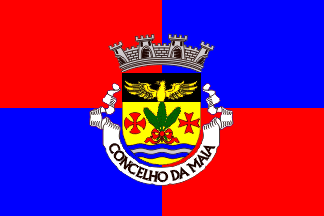
The previous flag and arms were adopted and published in the official
journal Diário do Governo : I
Série in 1936.05.26. It was divided querterly, also
red and blue (back then the rule of tinctures
apparently not so strictly enforced), had four towers in the crown
(town rank), and the scroll also read
"Concelho da Maia".
António Martins, 09 Nov 2007
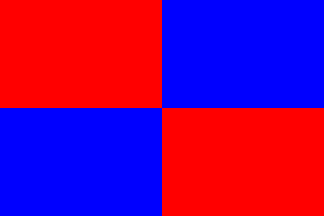
Plain (monocolored) portuguese subnational flags are
not allowed to have armless
variations: plain flags always carry the coat of arms.
Jorge Candeias, 18 Jul 1999
Maia municipality had 120 111 inhabitants in 2001, and it consists of
17 communes, covering 87,70 km². It is part of
Porto District, traditional province
Douro Litoral, 1999 ref. adm. region
Entre Douro e Minho, C.C.R. / NUTS II Norte, and NUTS
III Grande Porto.
António Martins, 09 Nov 2007
Passengers using Oporto International Airport (IATA: OPO, ICAO: LPPR) will
probably spot this flag, as it is located in Maia Municipality.
António Martins, 11 Nov 2007
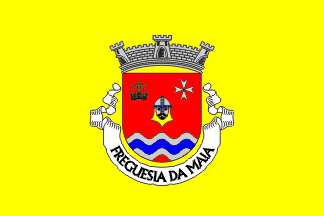
External links:
It is a fairly typical portuguese communal flag, with the coat of arms centered on a plain yellow background. Mural crown argent with three visible towers (commune rank) and white scroll reading in black upper case letters "Freguesia da Maia". The banner should have golden and red tassels and cord, and golden pole with spear finial. Flag and arms adopted and published in the official journal Diário da República : III Série in 2001.07.11:
Escudo de vermelho, cabeça de carnação barbada de ouro, com capacete de prata guarnecido de azul; em chefe; coroa mariana de ouro e cruz da Ordem de Malta, de prata; campanha ondada de prata e azul de três tiras. Coroa mural de prata de três torres. Listel branco, com a legenda a negro: "FREGUESIA DA MAIA".This coat of arms and flag were created by Luís Moreira, of GEPHA.
.gif)
The arms are Gules a head affronty Proper bearded Or helmeted Argent and
herdened Azure and in chief marian crown Or at dexter and maltese cross Argent
at sinister and on a fess wavy Argent in base a fess wavy Azure.
António Martins, 16 Aug 2008
This human head stands most likely for Gonçalo Mendes da Maia,
“o Lidador”, (1079?-1185), a military figure of early
Portuguese History.
António Martins, 24 Aug 2008
While the blazon prescribes golden beard and silvery helmet, this image
shows black beard and golden color for the lower part of the helmet. This
is not a mistake Sérgio would do, so I guess this is based on actual use
or even disagreement between the official text and the official image.
António Martins, 16 Aug 2008
Plain (monocolored) portuguese subnational flags are
not allowed to have armless
variations: plain flags always carry the coat of arms.
Jorge Candeias, 16 Aug 2008
Maia Commune is one of the 17 communes of the synonym
municipality; it had 9816 inhabitants in 2001 and covers
3,61 km².
António Martins, 16 Aug 2008
Anything below this line was not added by the editor of this page.